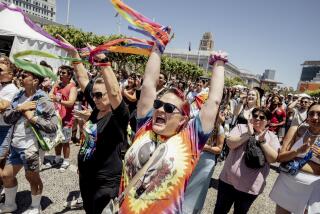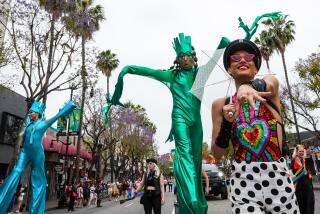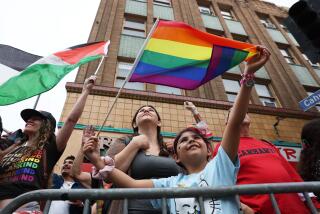In a Jerusalem First, Gays Take to Streets
- Share via
JERUSALEM — JERUSALEM -- Undeterred by the outrage of ultra-Orthodox Jews or fear of terrorist attack, hundreds of gay activists and their supporters marched through the heart of downtown Jerusalem under heavy police guard Friday in the city’s first gay pride parade.
By the ebullient standards of San Francisco or even Tel Aviv--where an annual march has for years drawn tens of thousands--it was a subdued affair, devoid of floats, marching bands or precision drills.
One man wore a red velvet dress and a blond wig with waist-length braids. A teenage girl had strapped rainbow-colored butterfly wings to her back, and many people waved rainbow banners.
But most of the men and women who walked quietly down King George V Street, the site of numerous suicide bombings, were dressed in jeans and T-shirts. For the most part, the sparse crowds that turned out to watch them neither cheered nor heckled as the marchers passed.
Gay activists in this riven and deeply conservative city said the mere fact that the parade took place was a victory for a community that for years has felt unwanted here, and for a city beaten down by nearly two years of Israeli-Palestinian bloodshed.
“This is a glorious day,” said Hagai El-Ad, one of the parade’s organizers and director of the gay organization Open House.
“Our office is on Ben Yehuda Street, where we have many times heard bombs go off near us,” he said. “This is our answer to that, to have a parade that isn’t just about lesbian and gay rights and equality, but about optimism. This is a chance for people to express their hope and say that they want to live together in Jerusalem.”
A handful of religious protesters held a small counter-demonstration and hoisted signs saying “You Are Not the People of Israel” and “Homosexuality, Bestiality and Terrorism Threaten Humanity.” But ultra-Orthodox rabbis had counseled their adherents to stay away from the march, which they regarded as an abomination.
Jerusalem Mayor Ehud Olmert expressed understanding for the marchers but didn’t attend and refused to share the costs of the parade. Nearly half of the City Council’s members belong to ultra-Orthodox or Orthodox religious parties.
“Not an agora of city money is being spent on those sickos, and the logistical support is from private donations,” Jerusalem City Councilman Eli Smaheyof said. The parade organizers have filed a court petition asking that the municipality be compelled to share the costs of the event. A ruling is expected within two months.
Gay life in Israel and the Palestinian-controlled areas of the West Bank and Gaza Strip is only tentatively emerging from underground. The Jewish and Muslim religious establishments frown on open displays of homosexuality, and gay groups have had to fight hard to gain acceptance. In 1993, Tel Aviv began hosting its gay pride parade, which has grown into an annual celebration that emphasizes the city’s relatively tolerant atmosphere.
But Jerusalem, holy to Jews, Muslims and Christians, has long been considered a hostile environment for gays.
Parade participants gathered first at Zion Square on Jaffa Street, another scene of frequent terrorist attacks, briefly infusing a downtown that most Jerusalemites avoid these days with life and color. Under arcs of purple, pink and blue balloons, participants waved placards and flags as they listened to taped rock music in Hebrew, Arabic and English.
An hour later than planned, they set off up the pedestrian mall that has been the scene for so many suicide bombing attacks toward King George V Street. Ilana Tapiro, 46, had come to watch.
“I’m supporting them because I believe in everybody’s right to be free,” said Tapiro, a Haifa resident whose daughter lives in Jerusalem. “People have to wake up and understand that [homosexuals] are not a virus; they don’t do anything bad.”
Nearby, Iris Cohen, 37, vehemently disagreed. Shaking with anger as she saw men holding hands with other men and women kissing women in the square, Cohen said that gays “contribute to the terrorist attacks.” Their public display, Cohen said, is evidence of how the nation has strayed from religion.
“It’s because these people are violating the Torah, that’s why we have terrorist attacks,” she said.
Police hustled away a handful of religious demonstrators who hurled epithets at marchers. But the parade proceeded largely peacefully, ending with a rally in the city’s Independence Park that police said drew about 4,000 people.
“This march is symbolic and very powerful,” said El-Ad, the activist. “The reality is that for decades, gay life here has been a life of complete absence from the public sphere. If you are gay, you do not exist in this city. For us, it is very moving to be able to openly walk the streets of a city which is also ours.”
More to Read
Sign up for Essential California
The most important California stories and recommendations in your inbox every morning.
You may occasionally receive promotional content from the Los Angeles Times.













